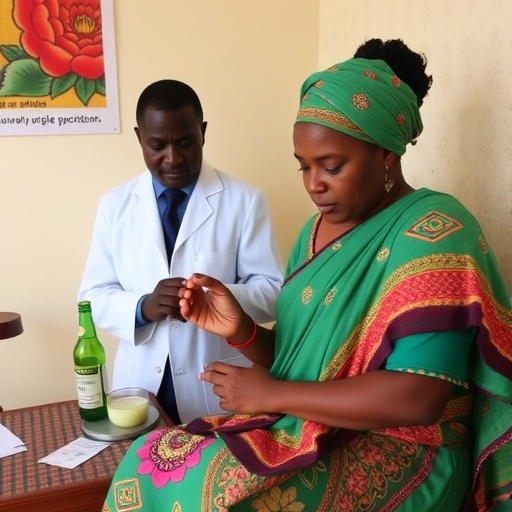In a profound exploration of healthcare paradigms, a recent study published in BMC Complementary Medicine and Therapies delves into the intricate relationship between traditional medicine and health system inclusivity for Cameroonian women. The research sheds light on how decolonizing healthcare perspectives can empower women and reinforce their agency, thereby rewriting the narrative of health within the African context.
At the crux of this investigation lies a recognition of centuries of colonial influence that have pervaded and often undermined traditional medical practices. The authors, E.A. Chance, P. Théophile, and L.R. Loe, underscore that traditional medicine is not merely a relic of the past but a living, evolving system that possesses profound cultural significance and application in contemporary healthcare. This article advocates for an integrative approach to health that respects, recognizes, and incorporates traditional healing methods alongside modern medical practices.
Cameroon, a nation with rich cultural diversity, is home to numerous ethnic groups, each with its own unique medicinal practices. The study propounds that traditional healers hold invaluable knowledge about local flora and fauna and possess techniques that have been honed through generations of empirical learning. This plethora of indigenous understanding is pivotal to addressing the specific health needs of women, who often face unique barriers in accessing quality healthcare.
The focus on Cameroonian women is particularly salient, as they navigate a myriad of health challenges exacerbated by societal norms and systemic inequalities. By integrating traditional medicine into the broader healthcare dialogue, the authors argue that we can move towards a more inclusive and equitable health system that addresses these disparities head-on. This systemic shift not only benefits women’s health outcomes but also fosters the broader community’s well-being.
Traditional healing practices often emphasize a holistic view of health that transcends physical ailments, considering emotional and spiritual conditions as equally critical. Such a perspective is crucial in a world increasingly aware of the biopsychosocial model of health. The researchers emphasize that honoring these holistic practices can greatly improve overall patient care and satisfaction, particularly for women who frequently juggle multiple roles within their families and communities.
In advocating for a decolonizing approach to healthcare, the authors highlight the importance of understanding and dismantling the power dynamics ingrained within health systems. They suggest that healthcare policymakers and practitioners must actively work to paraphrase established medical paradigms that often negate the validity of traditional medicine. This transition requires not only a shift in policy but a societal re-education on the value of diverse medical practices and belief systems.
Such a nuanced dialogue surrounding healthcare can pave the way for practical applications in medical education, enabling future healthcare workers to appreciate and respect patients’ cultural beliefs. The study posits that training medical professionals in traditional healing practices can foster a more empathetic and understanding approach to care, ultimately bridging the gap between conventional and alternative medical practices.
The implications of this research stretch far beyond Cameroon; they reflect a global need to reevaluate how we define and approach health and wellness. The traditional medical systems, which often face marginalization in favor of Westernized medicine, are worthy of recognition and integration in health sectors across various nations. By creating frameworks that celebrate traditional healing, societies can unlock innovative approaches to health provision that are culturally competent and contextually relevant.
As the conversation surrounding healthcare decolonization gains momentum, this research serves as a clarion call for integrated systems that empower marginalized voices. Women, as pivotal agents of change in their communities, stand to benefit immensely from health systems that are reflective of their unique needs and experiences. The role of traditional medicine in such a framework cannot be overstated, as it offers a treasure trove of accessibility and significance within a culturally relevant context.
The findings of this study are not only pertinent to policymakers and health practitioners but resonate with communities at large, stirring a collective introspection about health practices and beliefs. The dialogue it sparks encourages a broader understanding of a health landscape enriched by diversity, highlighting the intersectionality of gender, culture, and health practices.
In conclusion, the research illuminates the profound intersections of culture and health in Cameroon, making a compelling argument for the incorporation of traditional medical practices into the contemporary healthcare framework. By doing so, we honor the rich heritage of traditional healing while advancing toward a more inclusive, equitable healthcare system that recognizes and uplifts the voices of women and marginalized communities. The study advocates for a future where healthcare is both collaborative and holistic—creating pathways for healing that resonate deeply within the cultural fabric of society.
Ultimately, the findings beckon a wider audience to reconsider the simplistic dichotomy between traditional and modern medicine, urging us towards a holistic amalgamation that bears the potential to enhance health outcomes and empower individuals.
Subject of Research: The role of traditional medicine in building inclusive health systems for Cameroonian women.
Article Title: Decolonizing healthcare: the role of traditional medicine in building inclusive health systems for Cameroonian women.
Article References:
Chance, E.A., Théophile, P. & Loe, L.R. Decolonizing healthcare: the role of traditional medicine in building inclusive health systems for Cameroonian women.
BMC Complement Med Ther 25, 384 (2025). https://doi.org/10.1186/s12906-025-05133-0
Image Credits: AI Generated
DOI: 10.1186/s12906-025-05133-0
Keywords: Traditional medicine, Cameroon, decolonization, women’s health, inclusive health systems.
Tags: contemporary healthcare challenges in Camerooncultural significance of traditional healingdecolonizing healthcare perspectivesempowering women in healthcareethnic diversity in medicinal practiceshealth system inclusivityinclusive healthcare for womenindigenous medicinal practices in Africaintegrating traditional and modern medicinetraditional healers and local knowledgetraditional medicine in Cameroonwomen’s health and traditional practices





